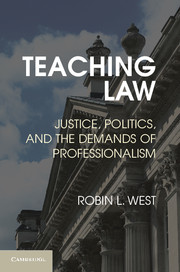Book contents
- Frontmatter
- Dedication
- Contents
- Acknowledgment
- Introduction The Trouble with Law Schools
- 1 The Unbearable Lightness of Justice
- 2 Politics and Its Discontents
- 3 The Bifurcated Academy: The Practice versus the Study of Law
- 4 Confronting Our Existential Challenge
- Some Conclusions
- Bibliography
- Index
- References
3 - The Bifurcated Academy: The Practice versus the Study of Law
Published online by Cambridge University Press: 05 June 2014
- Frontmatter
- Dedication
- Contents
- Acknowledgment
- Introduction The Trouble with Law Schools
- 1 The Unbearable Lightness of Justice
- 2 Politics and Its Discontents
- 3 The Bifurcated Academy: The Practice versus the Study of Law
- 4 Confronting Our Existential Challenge
- Some Conclusions
- Bibliography
- Index
- References
Summary
Law professors have long been chastised for loathing the professional practice of law. Unlike colleagues in other professional schools, members of the legal academy are neither required nor expected to maintain any connection with any aspect of professional practice. As a consequence, law professors do not generally have active practices on the side. For the most part, furthermore, law professors do not routinely consult, participate in major pieces of litigation as a matter of course, write amici briefs on important cases, or represent clients pro bono. Many are not active members of any bar association. Although law faculty are actively involved in leadership roles and as committee members in the AALS – the Association of American Law Schools – they do not typically participate in bar activities, or take an active role in American Bar Association leadership, other than ABA committees that are concerned with or involved in some way with the legal academy. Consequently law professors as a group and most law professors individually have almost no presence as lawyers in the profession’s life: its institutional life as constituted by the ABA or its day to day life, as constituted by the complex and varied activities of lawyers. The academy and the profession are two quite distinct institutions.
- Type
- Chapter
- Information
- Teaching LawJustice, Politics, and the Demands of Professionalism, pp. 131 - 173Publisher: Cambridge University PressPrint publication year: 2013



